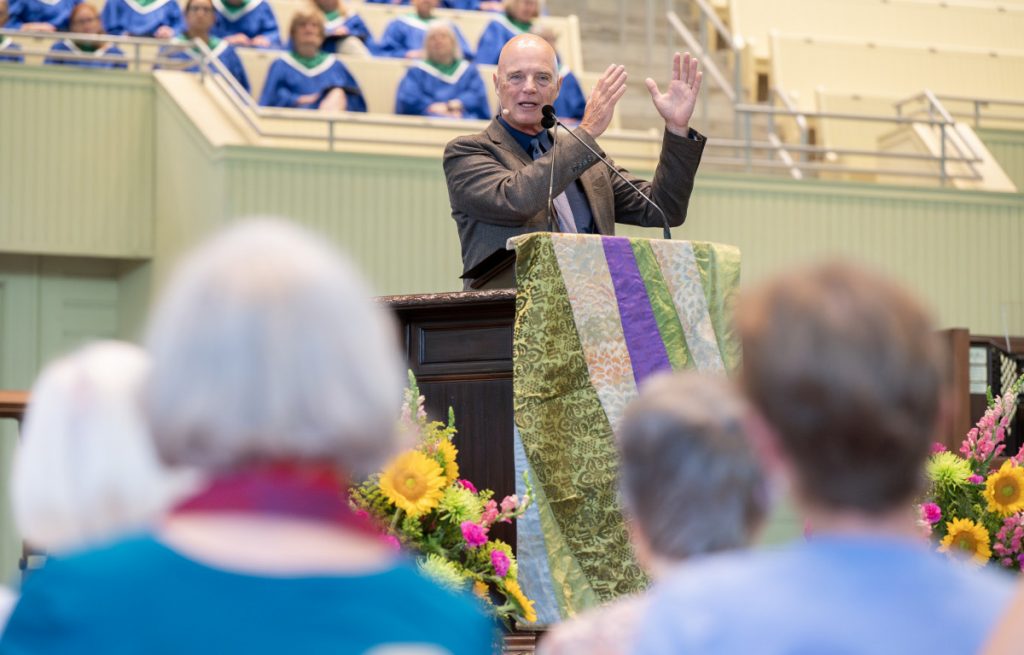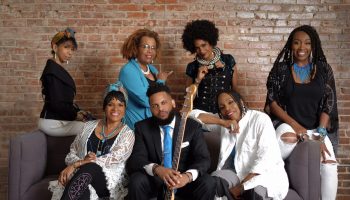
Column by Nia-Hyatt Eldosougi & Mary Lee Talbot
The air was full of anticipation at the 9:15 a.m. Tuesday morning worship service in the Amphitheater. The pews were fuller than normal as people arrived early for the Morgan Freeman lecture, just as they had come early to hear Doris Kearns Goodwin on Monday.
The Rev. Brian McLaren seized the moment to preach on “The Biblical Prophets as Visionaries of a Renewed Tradition.” The scripture reading was Hosea 6:1–6. The combination of preaching and the hymns and anthems for the day brought the congregation to their feet.
René Girard was a literary critic and anthropologist, and he was obsessed with a question: How did the bizarre, ugly tradition of human sacrifice pop up in diverse places around the world? It wouldn’t have spread from one place to the other. It seemed to just keep popping up in cultures around the world.
“Girard found that human sacrifice then was kind of downgraded to animal sacrifice,” McLaren said. “As he traveled around, speaking about his theories, someone came up to him and said, ‘Dude, you ought to read the Bible.’ He had never been that interested in the Bible, but he began to read the Bible. When he got to the passage in Hosea, his mind was blown. When Girard read these words, ‘For I desire mercy or compassion or love and not sacrifice,’ he said it was a breakthrough moment in human ethical, moral and spiritual development.” In the past, religion was every bit intertwined with culture and not a distinct category. This embedded quality allowed priests to maintain norms and keep them highly — or holy — regarded. “Priests are the ones who carry on the traditions and the rituals and the ceremonies that provide continuity. They do a kind of quality control for the moral lives of the people. They try to keep the values going that are necessary for people to not tear each other apart.”
To be seen as a priest during this period of history was no casual thing. The entrance into priesthood was tightly controlled in most cultures. McLaren noted that it was a very exclusive group. “You had to pass a lot of qualifications to be seen as a priest. You often had to grow up in a family where your father was a priest, because that way you would be instructed in this from your childhood.” McLaren then contrasted the priesthood with prophets — those who sprung up on occasion, not out of training, but eloquence and fury. These prophets often came to redirect people, including priests, back to God’s will. They would show the gap between how religious communities thought they were and how they actually were. McLaren said, “It took tough language. It sometimes took incisive poetry or powerful storytelling. It took what we might call art to get people to face the truths about themselves. Prophets had an artistic dimension to them. In fact, many of them, when we have their writings today, they’re in the form of poetry. … Priests help maintain, keep you from backsliding. Prophets try to keep you evolving, to try to keep you growing, and both were very, very important.”
Hosea — who showed up 750 years before Christ — had the signature line “God has some news for you all.” Hosea asked the people to return to God’s love that was based in justice, empathy and mercy. “At the heart of God is no desire for vengeance and bloodshed and violence. The whole idea of sacrifice isn’t really what’s at the heart of God,” McLaren said. “What’s at the heart of God is infinite, unending, radical, revolutionary love, compassion, empathy. We should be pretty nervous when empathy is being called a toxic trait.”
He also said: “And when Hosea speaks up for the word love or kindness or empathy or mercy, it kind of reminds me of (Episcopal Bishop Mariann Budde) earlier this year who had the courage to confront our nation’s leaders, not with an insult, but simply with a plea to not forget to be merciful.”
Richard Rohr, in his book The Tears of Things: Prophetic Wisdom for an Age of Outrage, wrote that a lot of times the prophet’s message begins with anger — anger about the arrogance and ignorance of people who think they’re exceptional, when really they’re poor and pathetic and pitiful and blind. Rohr found “anger is an essential first stage, and people who don’t feel it haven’t begun to awaken morally. But if anger is not just your first step, but also your last step, you haven’t gone on the journey of the prophet. Anger often leads to deep sadness and the sadness brings tears.”
“This pattern of anger leads to sadness, and when the sadness does its work in us, something happens, Richard realized. He realized that the anger is transformed into sadness, and sadness is transformed into love. And that seems to be what happens in this passage in Hosea.” McLaren gave a nod to modern prophets like Martin Luther King Jr and Desmond Tutu, but also musicians like Bob Dylan and Joni Mitchell, and historian Doris Kearns Goodwin. “Did you hear her revolutionary words? She held up the high standard of some of our past leaders, and she didn’t have to say much to show us the tragic gap between our past and our present, and what’s needed going forward. She said we need a political and moral and values-based revolution.” The congregation applauded. He concluded, “So brothers and sisters, Hosea said listen, what’s at the heart of things, what matters most is compassion.” The congregation applauded again. And they applauded after the singing of the final hymn, “My Soul Cries out with a Joyful Shout,” text by Rory Cooney. The text of the refrain ends with the words, “And the world is about to turn.”
The Rev. Mary Lee Talbot, Doctor of Philosophy, presided. William “Bill” Bates, umpire for the Chautauqua Softball League, read the scripture. The prelude, performed by organ scholar Owen Reyda on the Massey Memorial Organ, was Prelude, Op. 105, No. 3 by C.V. Stanford. The Motet Choir sang “See I Make all Things New” by Alfred V. Fedak under the direction of Joshua Stafford, director of sacred music and the Jared Jacobsen Chair for the Organist, and accompanied by Reyda. Stafford played “The People Respond — Amen!” by Dan Locklair for the postlude. Support for this week’s chaplaincy and preaching is provided by the Robert D. Campbell Memorial Chaplaincy and the Daney-Holden Chaplaincy Fund. Thank you to the 2025 Abrahamic Program for Young Adults Coordinators — Ori Edgar, Nia-Hyatt Eldosougi, Evans Nyamadzawo and Lizzy Schoen — for serving as guest columnists this summer, and to Mary Lee Talbot for coordinating the opportunity.




